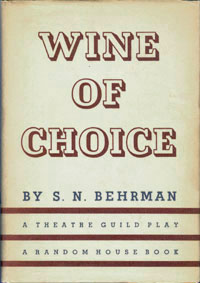|
 |
Wine
of Choice
S. N. Behrman
New York:
Random House, 1938
First edition in dust jacket |
|
Wine of Choice presents largely a
political tract represented by a zealous socially conscious
left-wing United States senator and a young, radical Marxist
on the extreme left, while a gentleman of immense wealth and
no discernible political interest (a male equivalent of
End of Summer’s Leonie Frothingham) provides the
anchorage to support such leftist political cantilever. A
guest of Laddy Sears, Binkie Niebuhr channels his major
energies toward convincing the wealthy Laddy to bankroll a
film to star Binkie’s protégée, Wilda Doran, and
subsequently to marry her. The romantic portion of this
arrangement becomes complicated with the arrival of Laddy’s
cousin, Ryder Gerrard, a liberal Democrat senator from New
Mexico, plus an ex-employee of Ryder’s, Dow Christophsen, a
young journalist-turned-Marxist novelist. The play concludes
with the unpredictable, "irresponsible" Wilda appearing on
the silver screen but not in front of an altar. Wine of
Choice symbolizes Behrman’s first failure in the genre
most closely associated with him, the drawing-room comedy.
This time the absence of a plot totally undid him for he
failed to follow his otherwise serviceable formula.
Heretofore at the center of Behrman’s plays was interesting
character development such as that of Clark Storey and
Serena Blandish. At the center of Wine of Choice is
Binkie Niebuhr who remains totally static throughout the
proceedings. He might have provided provocative secondary
character functions, like Harold Sigrift in Brief Moment
or Melchior Feydak in Biography. Not only does
Binkie polarize all of the action, but the proceedings
unfold in his bungalow which makes for very contrived
entrances and exits of major characters. (The genius of set
designer Lee Simonson also appears to have deserted him,
which only aggravates matters by compounding the author’s
misjudgment in locale.) Of no assistance at all, the pivotal
character of change, Wilda Doran, is negligibly dull,
totally lacking in the fire of comic spirit which ignites
Behrman’s other leading female figures. In mere theatrical
terms, she is too much offstage and too limited onstage for
the spectator to commit himself to her. This criticism might
equally be leveled against Laddy Sears and Ryder Gerrard
whose intermittent presence muddies the already turbid
waters, and even includes the antagonist, Dow Christophsen,
against whom Gerrard unleashes sincere political sentiments
in the closing moments of the play. Several critics made a
minor cause celebre of Behrman’s political sentiments.
Whatever their lack in theoretical wisdom, those thoughts
more than justify themselves in unadulterated theatrical
power; but a successful fusion between the politics and the
comedy of playwright Behrman never occurs all evening and
the play remains relegated to the reading shelf. It soon
became apparent to Miriam Hopkins, the film actress signed
to play Wilda, that Behrman would not achieve for her what
he had accomplished for Claire, Gordon, Fontanne, and Cowl.
She broke her contract following a number of missed
performances owing to a "mysterious illness." The Theatre
Guild had already rushed Alexander Woollcott to the tryout
city of Chicago and he began at once to rewrite every one of
his speeches. Philip Moeller, whose directorial hand guided
five of Behrman’s plays to Broadway, took ill, and Herman
Shumlin found himself recruited to the task of production
magician. (Moeller died later in the year.) The major fault
in focus of this script, coupled with the fractious nature
of the company, spelled doom, and Wine of Choice eked
out a meager forty-three performances on Broadway. This time
not even Woollcott’s presence offered succor from the early
demise of a comedy as lightweight as Brief Moment but
with far more serious dramatic flaws. |
|